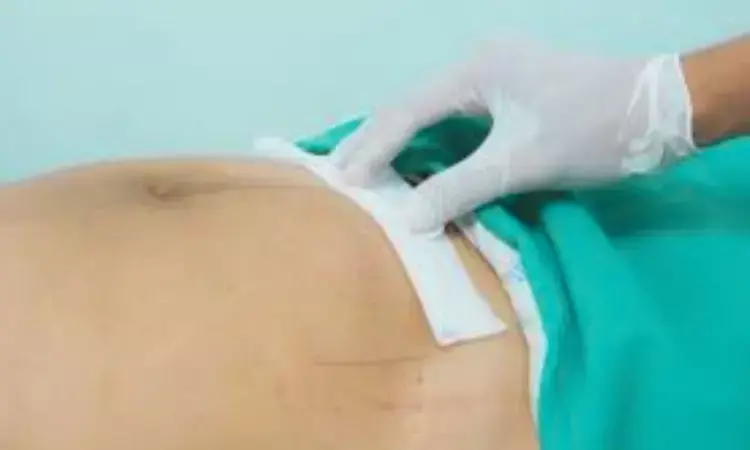- Home
- Medical news & Guidelines
- Anesthesiology
- Cardiology and CTVS
- Critical Care
- Dentistry
- Dermatology
- Diabetes and Endocrinology
- ENT
- Gastroenterology
- Medicine
- Nephrology
- Neurology
- Obstretics-Gynaecology
- Oncology
- Ophthalmology
- Orthopaedics
- Pediatrics-Neonatology
- Psychiatry
- Pulmonology
- Radiology
- Surgery
- Urology
- Laboratory Medicine
- Diet
- Nursing
- Paramedical
- Physiotherapy
- Health news
- Fact Check
- Bone Health Fact Check
- Brain Health Fact Check
- Cancer Related Fact Check
- Child Care Fact Check
- Dental and oral health fact check
- Diabetes and metabolic health fact check
- Diet and Nutrition Fact Check
- Eye and ENT Care Fact Check
- Fitness fact check
- Gut health fact check
- Heart health fact check
- Kidney health fact check
- Medical education fact check
- Men's health fact check
- Respiratory fact check
- Skin and hair care fact check
- Vaccine and Immunization fact check
- Women's health fact check
- AYUSH
- State News
- Andaman and Nicobar Islands
- Andhra Pradesh
- Arunachal Pradesh
- Assam
- Bihar
- Chandigarh
- Chattisgarh
- Dadra and Nagar Haveli
- Daman and Diu
- Delhi
- Goa
- Gujarat
- Haryana
- Himachal Pradesh
- Jammu & Kashmir
- Jharkhand
- Karnataka
- Kerala
- Ladakh
- Lakshadweep
- Madhya Pradesh
- Maharashtra
- Manipur
- Meghalaya
- Mizoram
- Nagaland
- Odisha
- Puducherry
- Punjab
- Rajasthan
- Sikkim
- Tamil Nadu
- Telangana
- Tripura
- Uttar Pradesh
- Uttrakhand
- West Bengal
- Medical Education
- Industry
Synthetic Mesh Remains Standard for Inguinal Hernia Repair, suggests JAMA study

Researchers have found in a new study that biological mesh offered no pain-reduction benefits and showed higher recurrence rates compared to synthetic mesh in laparoendoscopic hernia repair. The study was published in JAMA Surgery by Claudia S. and colleagues. Chronic postoperative pain and recurrence are still significant issues after inguinal hernia repair. Biological meshes, due to the resorbable nature, were brought in as a possibly safer and more comfortable solution to synthetic implants. The trial concluded that biologic meshes did not decrease postoperative pain and were significantly more likely to result in hernia recurrence than synthetic meshes.
The BIOLAP trial was a self-controlled, randomized, multicenter clinical trial involving between August 2017 and February 2021 in 21 certified German hernia centers. It involved 491 adult patients (mean [SD] age, 58.5 [14.1] years; 457 [93.1%] male) with primary bilateral inguinal hernias. Each patient received one biological mesh and one synthetic mesh with laparoendoscopic repair, making comparison within the same patient feasible. The operations were carried out following standardized methods—either transabdominal preperitoneal plasty (TAPP) or total extraperitoneal plasty (TEP).
Randomization allocated the side to which the biological or synthetic mesh was applied, and both the assessors and the patients were unaware of the type of mesh applied to each side. Coprimary outcomes were intensity of pain at 6 months postoperatively, as measured using the visual analog scale (VAS), and recurrence of hernia at 2 years. Secondary outcomes were complications like seroma, hematoma, infection at the surgical site, and patient satisfaction in general. Statistical analysis was carried out from July 2023 to June 2024.
Results
• The results indicated that there was no significant difference in postoperative pain between biological and synthetic meshes at 6 months.
• Both cohorts had a mean [SD] VAS pain score of 0.3 [0.9] at rest (P = 0.76), showing low pain in both materials.
• The 2-year recurrence rate was considerably higher among biological meshes, with 53 recurrences (11.2%), versus just 12 recurrences (2.5%) in the synthetic mesh group (P < 0.001).
• Additionally, seroma was more often developed by patients with biologic meshes (164 patients [33.4%]) than those with synthetic meshes (106 patients [21.6%], P < 0.001).
• The rates of other complications such as hematoma, infection, or dissatisfaction were similar between the two groups.
The BIOLAP trial showed that biological meshes do not decrease postoperative pain following laparoendoscopic inguinal hernia repair and have much higher recurrence and seroma rates than synthetic meshes. These findings highly recommend that biological meshes should not be used routinely for such repairs.
Reference:
Dr Riya Dave has completed dentistry from Gujarat University in 2022. She is a dentist and accomplished medical and scientific writer known for her commitment to bridging the gap between clinical expertise and accessible healthcare information. She has been actively involved in writing blogs related to health and wellness.
Dr Kamal Kant Kohli-MBBS, DTCD- a chest specialist with more than 30 years of practice and a flair for writing clinical articles, Dr Kamal Kant Kohli joined Medical Dialogues as a Chief Editor of Medical News. Besides writing articles, as an editor, he proofreads and verifies all the medical content published on Medical Dialogues including those coming from journals, studies,medical conferences,guidelines etc. Email: drkohli@medicaldialogues.in. Contact no. 011-43720751


